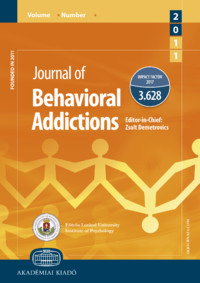Depression and anxiety symptoms associated with internet gaming disorder before and during the COVID-19 pandemic: A longitudinal study
Depression and anxiety symptoms associated with internet gaming disorder before and during the COVID-19 pandemic: A longitudinal study
Author(s): Zhaojun Teng, Halley M. Pontes, Qian Nie, Mark D. Griffiths, Cheng GuoSubject(s): Behaviorism
Published by: Akadémiai Kiadó
Keywords: perceived COVID-19 impacts; videogame use; Internet gaming disorder; depressive symptoms; anxiety symptoms
Summary/Abstract: Background. The coronavirus disease-2019 (COVID-19) pandemic has profoundly impacted aspects of human life globally. Playing videogames has been encouraged by several organizations to help individuals cope with the COVID-19 pandemic and associated restrictive measures. This longitudinal study was the first to examine gaming in the context of the pandemic and its association with depressive and anxiety symptoms. Methods. The sample comprised 1,778 children and adolescents (50.7% male) who were part of the Project of School Mental Health in Southwest China. Data were collected at two-time intervals: before the COVID-19 pandemic (October to November 2019 – [T1]) and during the COVID-19 pandemic (April to May 2020 – [T2]). Data were collected on perceived COVID-19 impacts, videogame use, Internet Gaming Disorder (IGD), and depressive and anxiety symptoms. Cross-lagged panel models were computed to examine longitudinal relationships. Results. The results indicated that both videogame use and IGD increased significantly for adolescents at T2. The cross-lagged panel model results suggested that depressive and anxiety symptoms at T1 positively predicted IGD and videogame use at T2 (especially for boys), but not inversely. Perceived COVID-19 impacts mediated the relationship between depressive and anxiety symptoms at T1 and IGD at T2. Conclusion. Children and adolescents both increased videogame use at T2, but only adolescents significantly increased IGD severity at T2. The findings supported the compensatory hypothesis, and are consistent with the Interaction of Person-Affect-Cognition-Execution model as individual responses to COVID-19 may function as a mediator between personal predisposing variables and IGD.
Journal: Journal of Behavioral Addictions
- Issue Year: 10/2021
- Issue No: 1
- Page Range: 169-180
- Page Count: 12
- Language: English

